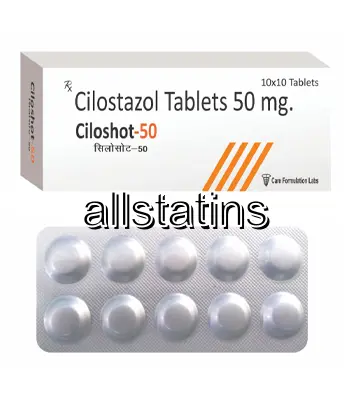| Package | Dosage | Price | Price per Dose | |
|---|---|---|---|---|
| Dosage: 50mg | ||||
| 360 pill | 50mg | AUD777.99 | AUD2.16 | |
| 180 pill | 50mg | AUD416.95 | AUD2.31 | |
| 120 pill | 50mg | AUD315.25 | AUD2.62 | |
| 90 pill | 50mg | AUD266.94 | AUD2.97 | |
| 60 pill | 50mg | AUD198.29 | AUD3.31 | |
| 30 pill | 50mg | AUD104.22 | AUD3.48 | |
| Dosage: 100mg | ||||
| 360 pill | 100mg | AUD1,355.14 | AUD3.76 | |
| 180 pill | 100mg | AUD686.46 | AUD3.81 | |
| 120 pill | 100mg | AUD467.80 | AUD3.89 | |
| 90 pill | 100mg | AUD361.01 | AUD4.02 | |
| 60 pill | 100mg | AUD246.60 | AUD4.12 | |
| 30 pill | 100mg | AUD139.81 | AUD4.65 | |

Cilostazol Description
What is cilostazol?
Cilostazol is a prescription medicine used to improve walking distance in people with intermittent claudication from peripheral arterial disease. It belongs to the class of drugs known as PDE3 inhibitors. The medicine works by widening blood vessels and by reducing the clumping of platelets. This combination helps blood flow reach the legs more easily and can ease leg pain during walking. It is prescribed for adults and is usually taken for several weeks to assess its effect.
How cilostazol works
It acts as a phosphodiesterase-3 inhibitor. This raises levels of cyclic AMP in smooth muscle and platelets. The result is wider arteries and less platelet sticking. Better blood flow can reduce symptoms of claudication and may help you walk further with less pain. The effect may take several weeks to become noticeable, and ongoing use is often needed to maintain benefit.
How to use cilostazol
Take the tablet after a meal to help absorption and reduce stomach upset. The usual dose is 100 mg twice daily. If you are sensitive to the medicine, your doctor may adjust the dose to 50 mg twice daily. Do not crush or chew the tablets. Swallow with water. If you miss a dose, take it as soon as you remember unless it is near the time for the next dose. Do not double up to catch up. Do not start or stop medicines without consulting your clinician.
Who should not take cilostazol
Cilostazol should not be used in people with heart failure of any type. It is not suitable for patients with active bleeding or a high risk of bleeding. People with severe liver disease should avoid it. If you have had a stroke or a transient ischemic attack within the last six months, discuss alternatives with your doctor. Pregnancy and breastfeeding require careful consideration, so talk to a healthcare professional before use. Always share your full medical history with your clinician before starting this medicine.
Possible side effects
Headache is common and often mild. Other frequent effects include nausea, diarrhea, dizziness, and flushing. Some people notice palpitations, swelling of the legs, or stomach pain. Less common effects can be allergic reactions or chest pain. If you see signs of a serious reaction—such as severe bleeding, fainting, severe chest pain, or swelling of the face or throat—seek medical help promptly. Side effects often improve with time or dose adjustment.
Precautions and interactions
Tell your doctor about all medicines you take. Cilostazol interacts with drugs that affect liver enzymes, especially CYP3A4 and CYP2C19. This can raise or lower cilostazol levels. Examples include certain antifungal medicines, some antibiotics, and some seizure drugs. Grapefruit juice can also increase levels. Medicines that affect blood clotting, such as aspirin or warfarin, may increase bleeding risk when used with cilostazol. Do not start or stop medicines without professional advice. Limit alcohol if you notice more dizziness or blood pressure changes.
Storage and general notes
Store tablets at room temperature in a dry place away from children. Keep the bottle closed tightly and check expiry dates before use. Do not use if the packaging is damaged. If you have questions about cilostazol or its use, consult the pharmacist at the online store. This information is a general guide and does not replace a doctor’s prescription or personalized advice.
